
Select Page
“The mothers on our estate won’t go to the hospital to deliver their babies but you bother me to take you to the hospital,” a Sri Lankan plantation worker admonished his pregnant young wife. “You don’t know what they tell us at the clinics. I can’t die at home,” she replied, not looking at him. “Do not listen to all the other people. Just do what the doctor says.” And with that, the woman’s concern for herself and her unborn child was dismissed.
As the African proverb goes, it takes a village to raise a child. But the people of the Rothschild and Sogama tea plantations of Nuwara Eliya in Sri Lanka had been frequently denied this basic privilege for years. In the mid-1990s, the maternal mortality rate (MMR) on tea plantations across Sri Lanka ranged from 0.9 to 1.9 per 1,000 live births, which was higher than the national average. As recently as 2012, the infant death rate in the country stood at 6%, with every single case occurring on the plantations. Over the next year, that figure climbed to 20%.
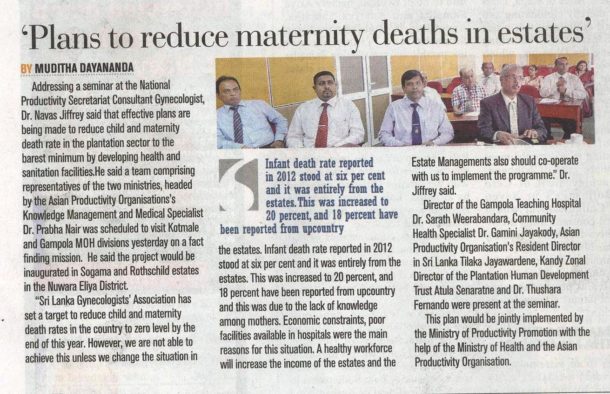
Newspaper article on the soft launch of the demonstration project published 9 July 2014.
Health professionals blamed those deaths on community ignorance of maternal healthcare. But there were also other challenge. The harsh terrain, poor access to antenatal care, and the great distances pregnant women had to travel to reach a government institution for emergency obstetric care also played significant roles. In addition to that, the plantation culture was a unique one where living conditions differed from those in the rest of Sri Lanka, especially where home births were concerned.
In 2013, the alarmed President of the Sri Lanka College of Obstetricians and Gynecologists (SLCOG) set a priority target of “zero maternal deaths with minimal morbidity” by 2014. Extra emergency obstetric care and more skilled midwives and attendants were introduced in efforts to reach this target, but none of those attempts dented the MMR figures.
The SLCOG was thus forced to acknowledge the sobering reality: its ambitious target would be a pipe dream as long as the situation on the plantations remained unchanged. The estate community would continue to be plagued by high MMRs as long as knowledge of maternal healthcare did not flow from healthcare providers into homes. For some time, that seemed fated not to occur. Then, in 2014, there was a glimmer of hope. The Asian Productivity Organization (APO) decided to undertake a knowledge management (KM) demonstration project on the Rothschild and Sogama Estates. The APO’s demonstration projects are aimed at utilizing practical applications of productivity tools and techniques in the industry, service, and agriculture sectors. The results are documented and used as best practices for other countries and national productivity organizations (NPOs).
This particular community-based demonstration project in Sri Lanka was the first of its kind under the APO’s strategic direction of developing SMEs and communities. Its objective was to showcase a community’s ability to design and implement productivity enhancement initiatives successfully with the active participation of all stakeholders.
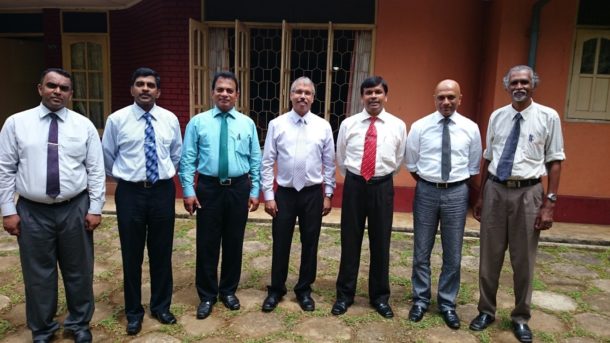
The Steering Committee comprised of APO, NPS, and local experts who identified the direction and objectives of the KMI demonstration project.
The National Productivity Secretariat (NPS), the NPO of Sri Lanka, was expected to highlight the role of productivity gain-sharing in boosting morale, motivation, welfare, and the overall achievement of community goals. In addition, this demonstration project had ties with the APO’s training course on KM, which was implemented in Sri Lanka in December 2013. Its KM projects had already shown a track record of success in the manufacturing industry, and the APO was certain that it would achieve the same results in the health and services sector.
“Bringing the MMR down to zero in the estate sector was a major challenge and KM was recognized as an intervention strategy to reduce the MMR,” explained Praba Nair, the APO expert for the project in Sri Lanka. “KM is an integrated approach for creating, sharing, and applying knowledge to enhance organizational productivity, profitability, and growth. In Sri Lanka, it was used to bridge the knowledge gap between the healthcare providers and the estate community.”
Acutely aware that an understanding of and being able to work respectfully within the plantation culture were crucial to this project’s success, the Ministry of Health (MOH) and SLCOG decided that a wider group of stakeholders needed to be involved in the APO’s KM project. A group was formed comprising representatives from the MOH, NPS, Plantation Human Development Trust, and Base Hospital Gampola.
In June 2014, the APO expert paid a first visit to the Rothschild and Sogama plantations for a soft launch of the project and to meet with key stakeholders. The three-day visit included an assessment survey among the staff of the MOH and the Base Hospital Gampola to determine whether the KM system would deliver a sufficiently significant impact to reduce the MMR. “Once it was obvious that it could, the APO KM framework was applied to design a system to alleviate the maternal and child health problems in the plantation sector,” reported Praba.
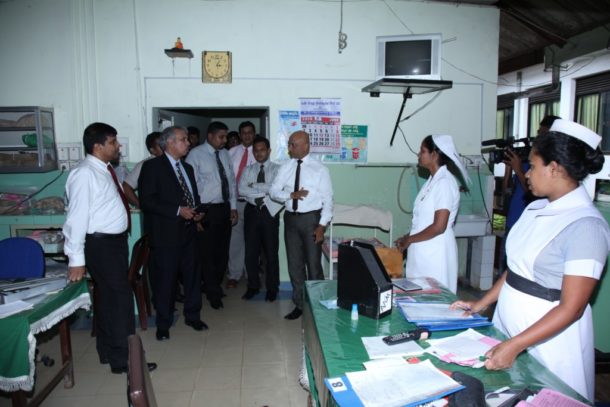
Visit by APO Expert Praba Nair to Base Hospital Gampola, guided by hospital director Dr. Sarath.
Focus group interviews were also conducted with pregnant women and their husbands on the plantations. That was when the issues of a lack of literacy and low education levels became glaringly apparent, as did the men’s reluctance to hand over the care of their wives to medical professionals. Some husbands openly questioned the need for medical expertise during birth and referred to successful home births within the community to back up their arguments.
By the end of the initial visit, a Steering Committee and Working Committee had been established to focus on three key areas on the plantations: antenatal care and education for pregnant women; safe, pain-free deliveries in the hospital; and postnatal care and education. These goals won immediate full support from the healthcare staff and workers. “They warmly welcomed and received us,” recalled Praba. “They were grateful that their plantations had been chosen for this pilot project from the many others that were keen to come onboard.”
When the APO expert made his second visit to the plantations a month later, a team of 20 volunteers from each estate was put together. The volunteers comprised young members of the community who attended seminars and workshops under the KM project. They were identified as the KM champions of their respective divisions and responsible for sharing the values and virtues of the KM project within the community. “As the main aim of this program was to reduce MMRs, we accomplished a lot by educating the plantation communities and sharing our knowledge with them,” said one of the volunteers.
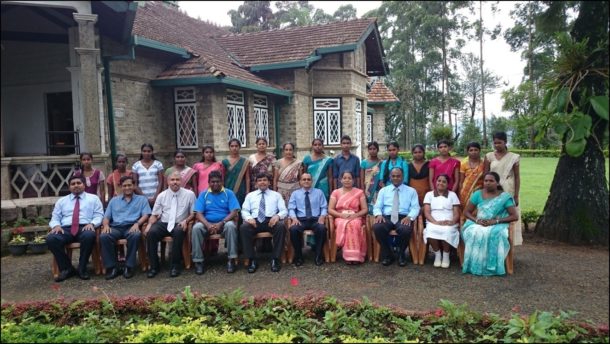
Volunteers on the Rothschild estate.
One of the earliest key takeaway messages from this project was that the volunteers were willing to take ownership of KM initiatives if they were given responsibility and accountability. Another clear message was that community-based projects have the potential to build strong cooperation and solve real problems. Over the next 15 months, the two committees, volunteers, and healthcare staff cooperated to push for every small possible change within the plantation systems, infrastructure, and mindsets. Each small victory sparked a domino effect that added to the project’s potential for success.
Besides improving the health of pregnant women, basic productivity concepts like 5S, the 3Rs, and kaizen were also introduced in a move to improve productivity on the estates, and it took less than six months for changes to start emerging. One of the earliest noticeable ones was the improved facilities at the Base Hospital Gampola. The staff separated the clinics from the wards, which meant more peaceful stays for inpatients, especially new mothers. Hospital Director Dr. Sarath Weeerabandara proudly announced, “We now have new obstetric theaters for emergencies and surgeries related to deliveries.” A third new operating theater was dedicated to ear, nose, and throat procedures.
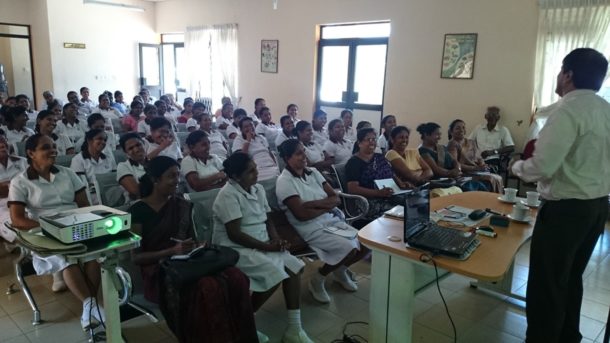
Consultant Obstetrician & Gynaecologist Dr. Nawaz Jiffry addressing Base Hospital Gampola staff on demonstration project goals.
The 5S program rolled out at the hospital led to more organized workspaces in the operating theaters and a proper disposal system for used syringes and medical supplies. What the project team found particularly impressive, however, was the hospital staff’s unexpected ownership of the building’s cleanliness and appearance. A group of them rallied their families and friends together to help paint the hospital walls in efforts to create a more conducive environment for serving and healing. This communal approach extended to the two plantations where the communities began working together to improve living conditions and their surroundings. For example, during the industrial action in the course of the project, the estate workers took it upon themselves to do a massive cleanup without any instruction from the estate superintendent. This demonstrated a change in their attitude: they were taking ownership of their livelihood.
After NPS Coordinator Nihal Hennayake conducted the 5S and 3R programs on both plantations, the level of housekeeping improved noticeably. Households began setting up a proper system for waste disposal for the first time. The Rothschild plantation then set out on a mission to build 200 latrines, which was soon followed by the Sogama plantation.
By the APO expert’s third visit, it was apparent that the KM project was making sweeping changes in the communities’ attitudes as well. Regular health talks and provision of healthcare materials encouraged pregnant women to take their diets more seriously. In efforts to eat healthier, families began to grow vegetable patches in their backyards. On the Sogama plantation, 13 fish hatcheries were created and harvested for personal consumption as well as to supplement incomes.
The volunteers worked hard to check up regularly on pregnant women and ensure that they were taking the prescribed vitamins and supplements. This eventually spurred the women to head to clinics by themselves for frequent check-ups without being prompted.
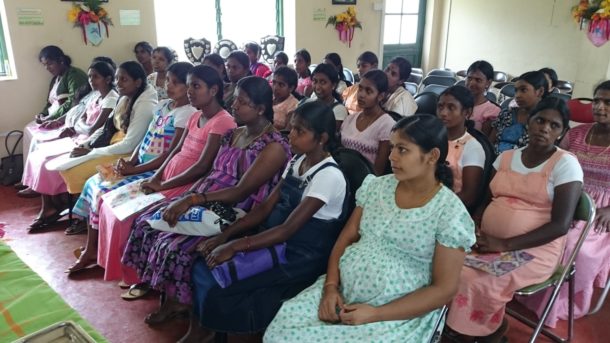
Expectant mothers on the estates attending a health and nutrition briefing.
This boosted level of self-care had a spillover effect on the men as well, who transitioned from grudgingly attending the health talks to willingly looking after their wives’ needs and agreeing to let medical professionals take over during labor and birth. The remaining family members soon followed suit. Huge grins at the births of healthy babies encouraged other families to accept the same medical assistance.
But the most tangible impact of the KM project was the 24/7 hotline for estate medical assistants to contact the hospital during an emergency. This hotline was put to the test almost immediately at each of the plantations and passed with flying colors. A pregnant woman from the Rothschild plantation, who had a history of miscarriages, delivered her baby safely after she was taken to the hospital in time. Another from the Sogama plantation also had a safe birth, despite high blood pressure levels, thanks to her quick transfer to the hospital.
The general health screenings and treatments also raised productivity levels on the plantation sites by improving the workers’ hand–eye coordination and hemoglobin levels. “Quality tea depends on the correct plucking of two leaves and a bud,” explained Dr. Nawaz Jiffry, Consultant Obsterician and Gynecologist at the Base Hospital Gampola. “This is called selective harvesting and is hugely dependent on hand–eye coordination. For this coordination to be at its peak, the human brain needs a good supply of blood rich in hemoglobin. It has been scientifically proven during this project that workers with normal hemoglobin levels will perform above average on the plantation. The extra kilograms of leaves that they pluck have resulted in extra income for themselves, their homes, the estate, and the country.”
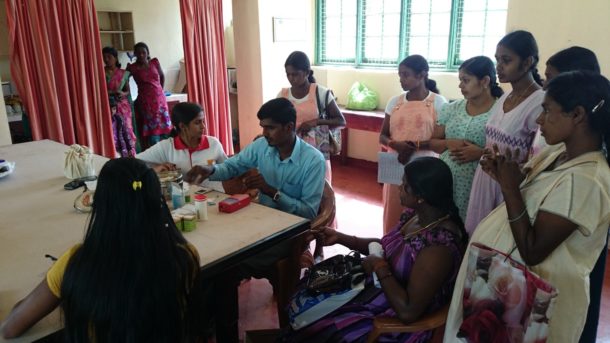
Health screening for pregnant women on the estate.
The hand–eye coordination scores of women on the Rothschild Estate rose by an average of 35% between 2014 and 2015, while Sogama Estate saw an average 20% increase in the same period. Women’s hemoglobin levels climbed an average 40% on the Rothschild Estate and an average 30% on the Sogama Estate between 2014 and 2015. This subsequently resulted in a 2.63% jump in the annual crop harvested on the Rothschild Estate and a 3.39% rise on the Sogama Estate between 2014 and 2015.
SLP Vithanage, the Group Manager of Rothschild Estate, was ecstatic at the results. He later said, “For the first time in history, our pregnant mothers are getting an obstetrician with a portable ultrasound machine at a regular outreach clinic. This is a real privilege. All my workers are being screened for general health and we started to maintain health records. No deaths occurred during the KM project period.”
“KM is a very powerful tool,” acknowledged Suranga Gunarathna, then NPS Director in Sri Lanka. “This is the first time we are using this tool at the community level. The KM project will be a role model in the APO’s history and for Sri Lanka’s health centers.” By November 2015, the project team, volunteers, and beneficiaries of the KM project had unanimously agreed that no truer words had ever been spoken. The communities on both plantations displayed more confidence in making healthier decisions on how to live their lives and had better social attitudes.
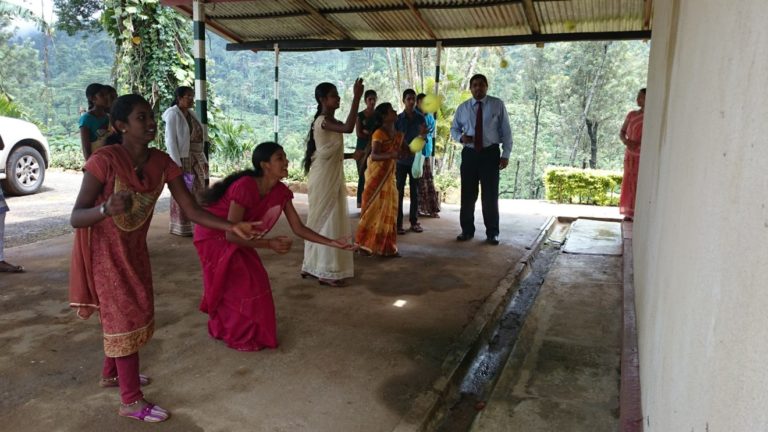
Plantation workers performing exercises to improve hand–eye coordination.
Their homes also reflected the new way of life, with more orderly household management and hygienic disposal of waste. The vegetable patches and fish hatcheries continued to flourish, as did the workers’ additional income. “I was impressed by this project, which did not create any problems for the management,” commented Chaminda Senarathna, the General Manager of the Sogama Estate. “Thanks to the volunteers, we were able to achieve our health and productivity goals. The success of this pilot project has made me keen to continue this work here.”
0 Comments